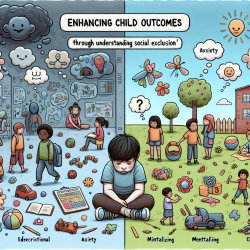Introduction
In the quest to improve mental health care delivery in schools, practitioners often face the challenge of limited resources and workforce shortages. The research article "Applying systems thinking to task shifting for mental health using lay providers: a review of the evidence" by D. Javadi et al. offers a promising approach to address these issues through systems thinking and task shifting.
Understanding Systems Thinking and Task Shifting
Systems thinking is a holistic approach that considers the interconnections within a system, such as the educational and health sectors. Task shifting involves delegating tasks to less specialized personnel, like lay providers, to optimize resource use and improve service delivery. This approach is particularly beneficial in low- and middle-income countries where mental health services are scarce.
Key Findings from the Research
The study reviewed 30 studies and found that task shifting for mental health care using lay providers is effective and feasible. Although no studies explicitly used systems thinking tools, many demonstrated characteristics such as stakeholder engagement and cross-sector collaboration.
- Positive outcomes were observed in mental health care delivery through task shifting.
- Systems thinking characteristics were evident in stakeholder engagement and capturing unintended consequences.
- Most studies addressed elements beyond direct service delivery, such as community engagement and health workforce dynamics.
Implications for Practitioners
For practitioners in the field of speech language pathology and school-based therapy, implementing systems thinking and task shifting can lead to significant improvements in mental health care delivery. Here are some actionable steps:
- Engage Stakeholders: Involve teachers, parents, and community members in the planning and implementation of mental health programs.
- Utilize Lay Providers: Train and empower lay providers, such as teaching assistants, to deliver basic mental health support under supervision.
- Adopt a Systems Approach: Consider the interconnectedness of various elements in the school environment and how they impact mental health outcomes.
Encouraging Further Research
While the research provides a solid foundation, there is a need for further exploration into the use of systems thinking tools in evaluating task-shifting interventions. Practitioners are encouraged to conduct studies that incorporate systems dynamics modeling to better understand the complexities of mental health care in schools.
Conclusion
By adopting a systems thinking approach and utilizing task shifting, practitioners can enhance mental health care delivery in schools, leading to better outcomes for children. This approach not only optimizes resources but also fosters a supportive environment for mental health care.
To read the original research paper, please follow this link: Applying systems thinking to task shifting for mental health using lay providers: a review of the evidence.










